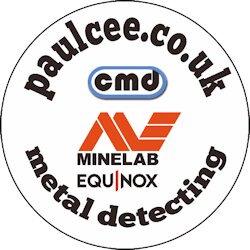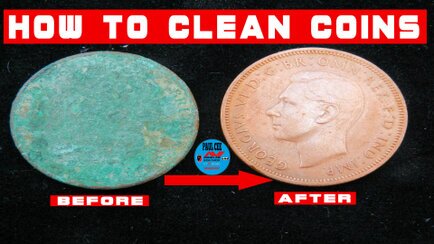clean corroded old copper coins
Published by David Wallace in coin cleaning · Wednesday 28 Aug 2019 · 3:30
Tags: coin, cleaning, ultrasonic, cleaner, clean, corroded, coins, coin, tumbler
Tags: coin, cleaning, ultrasonic, cleaner, clean, corroded, coins, coin, tumbler


How to clean corroded copper coins
Clean only worthless or filthy coins.
If you have coins that have little value and you are not planning to collect or sell to a collector, you may wish to clean these for purely aesthetic reasons. It’s also up to you whether or not to clean extremely dirty coins. If a coin is so blackened or tarnished that its face is all but invisible, you may decide to accept the risk and clean it
Clean old coins with water.
To clean your coins without risking damage to the surface and a reduction of value, you should use only water. Grasp a coin by the edges, and hold it under a gentle stream of lukewarm distilled water. Flip the coin over so that the reverse side is also wet. Then, gently pat the coin dry with a soft cotton towel. This will remove some superficial dirt without scratching the coin.
If you live in a city, the tap water will be treated with chlorine. This chemical will discolor the face of your coin. To avoid this, either purchase distilled water from your supermarket, or clean coins under water from a purifier.
Clean old coins in a weak soap solution.
If the distilled water was too weak to effectively clean the surface of a dirty or encrusted coin, the only other non-damaging option is to use a weak soap solution. Pour a small amount of a weak liquid soap into a large bowl, and then fill the bowl with tepid distilled water. Grasp your coin by the edges, and swirl it around in the soap solution. Then rinse the coin under distilled water and pat dry with a clean cloth
Do not use dish detergent to clean your coins; it’s too powerful and abrasive. Instead, use a weak, gentle soap, such as hand soap.
Baking Soda and Water
A lot of metal detecting people have used and still do use baking soda and water to clean surface dirt from coins. This method often leaves a shine on detailed points of the coins. Simply mix a little baking soda and water together and slide thecoin between your fingers.
Clean old coins with vinegar.
To clean an old coin with vinegar, pour a cup of vinegar into a glass or bowl, and then gently set the coin at the bottom. Let the coin soak for a few minutes. Then grasp the coin by its edges, pull it out of the vinegar, and rinse it clean with distilled water and dry
Scrub old pennies with ketchup
To clean a copper penny, squeeze out a small amount of tomato ketchup onto the face and back of the coin. While you’re grasping the coin firmly by its edges, use a clean toothbrush to lightly scrub the flat surfaces of the coin.
The salt and vinegar in the ketchup will remove tarnish from the penny. Then rinse the coin clean under distilled water and pat dry with a clean cloth.
This method works best on pennies produced before 1982. Pre-1982 pennies were made using real copper, whereas post-1982 pennies contain zinc, which will not be cleaned with ketchup.Be aware that ketchup is mildly acidic, and so may end up reducing the penny’s value.
Never clean coins with abrasives or acids.
Although abrasive products are often advertised on TV or in stores as effective for cleaning coins, this is not the case. Acidic cleaners remove some of the material of the coin’s surface during the process of cleaning it. Although this will make the coin look cleaner and improve its shine, the coin will be damaged and its value diminished.
Similarly, you should never scrub or scrape coins in order to remove tarnish or blackness. Products like steel wool or wire brushes will irreversibly damage your coins and remove their value.
8 reviews
